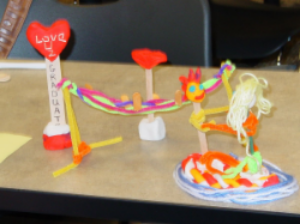
Healthy relationship education largely resides in nontraditional education settings—part of 4-H and other community-based character development programs. Yet, it is something all youth should learn. Traditional education settings—schools—can give much wider exposure to this important facet of education. Looking back on the healthy relationship education work that I led as a graduate student nearly 10 years ago at Auburn University, I am pleasantly surprised to see it is still being funded. I find myself asking, what makes this particular work, especially considering its nontraditional focus, so sustainable in the traditional education setting?
Auburn University’s College of Human Sciences’ work is part of the federal Healthy Marriage Initiative, a project funded by the Department of Health and Human Services (DHHS), Administration for Children and Families, and other smaller state grants, and focuses on educating youth on healthy relationships and marriage. To understand this particular work and its sustaining forces, I interviewed Auburn Professor and Associate Dean for Research and Graduate Studies, Dr. Jennifer Kerpelman, one of the pioneers of this work that began as part of Alabama’s Healthy Marriage Initiative. Dr. Kerpelman was the principal investigator for Healthy Couples, Healthy Children: Targeting Youth (HCHCTY) and is co-investigator for the Alabama Healthy Marriage and Relationship Education Initiative (AHMREI). HCHCTY implemented and evaluated a healthy relationship education curriculum for adolescents, Relationship Smarts Plus (RS+), in 100 Family and Consumer Sciences classrooms (FCS) in Alabama high schools. After two years, the program expanded to health classes to engage more male students. At the end of the five-year cycle, more than 200 teachers taught RS+ in their classrooms reaching more than 10,000 students. Many of these teachers continue to use the RS+ Lessons in their classrooms today.
The program has shown success. In surveys and focus groups, students demonstrated changing beliefs about healthy relationships, casting off faulty relationship beliefs—such as the belief that love is enough to sustain a relationship—and rejecting the perpetration of aggression.
Dr. Kerpelman identified a key component to program sustainability of youth-focused relationship education programs: flexible implementation models that meet different audience needs and timeframes, allowing greater reach and a classroom teacher to be as hands-on or hands-off as desired or needed. In addition, Dr. Kerpelman said that working with schools requires one to “be flexible when school schedules change and to engage in clear and regular communication with teachers.”
Another important component to sustaining the work has been continued learning and evaluation, using an iterative approach to evaluation and program improvement. Dr. Kerpelman emphasized the importance of frequent staff meetings to discuss the implementation process, and conducting process evaluation to understand the feedback from all stakeholders. “Knowing your audience is important, their background, experiences, and current attitudes and biases. For example, we learned that using examples from a Caucasian, middle-class perspective may not be as applicable to urban or rural minority youth, so we added new examples for facilitators with diverse audiences,” she explained.
Finding a place in the traditional school setting was vital to the success of this project because the vast majority of youth can be reached there. “Many adolescents do not have positive models for what a healthy relationship looks like, regardless of family structure or socioeconomic status,” Dr. Kerpelman said.
While FCS classes were a natural fit, they are electives and typically attract few male students, which led to the project’s eventual expansion into health classes to reach every student. Dr. Kerpelman discussed why it’s important to offer relationship education classes broadly. “When only youth who are deemed ‘high risk’ are targeted for relationship education programming, this contributes to stigmatization of these youth and also misses many youth who do not show any signs of being at risk for problems but are actually experiencing them,” she said. A major challenge to widespread integration was effective demonstration of the program’s value for health teachers, showing how RS+ curriculum content supplemented and enhanced existing health education standards and goals. It was important for health teachers to see how “the material helped them meet objectives in creative, engaging ways,” she explained.
Dr. Kerpelman shared a few key points on how to sustain nontraditional programs in traditional settings, maintain adequate funding, and keep funders happy:
- Do what you say you’re going to do and how you’re going to do it.
- Be a model for what others should do.
- Demonstrate the project’s effectiveness and the value-add to the funder.
- Stay abreast of the funder’s mission, and ensure that the work supports it.
- Develop and sustain relationships with project and program officers.
Auburn’s work is an example of how programs—specifically those with nontraditional topics such as healthy relationship education—can be sustained in schools to reach a larger youth audience.
What other nontraditional programs could be sustained using this model? How have you implemented nontraditional programs within your school’s setting?
Katie Andersen is a managing researcher at McREL. She leads research and evaluation projects, including design, implementation, and reporting. Katie has a passion for promoting positive youth development through the implementation and evaluation of educational initiatives, providing solutions that meet client needs.



This article exemplifies a technique getting to know your student without judgement. The different strategies studied offered does not appear difficult to implement. As a Master’s candidate in Special Education, it is rewarding to see more softer approaches than the disciplinarian approach. Accountability is important to children and when it is seen by their teachers, I have seen better response and confidence. We always made our classrooms a safe place. This information is vital to any teacher that wants to succeed in classroom management.